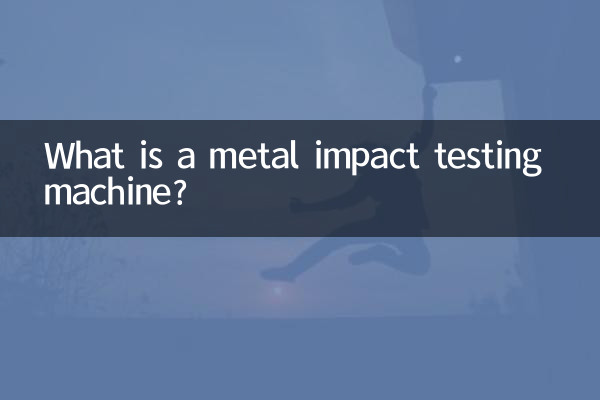What is a metal impact testing machine?
The metal impact testing machine is a special equipment used to test the impact resistance of metal materials under dynamic loads. It is widely used in metallurgy, machinery manufacturing, aerospace, automotive industry and other fields to help engineers and researchers evaluate the toughness, brittleness and impact resistance of metal materials. This article will introduce in detail the definition, working principle, application fields and related data of metal impact testing machines.
1. Working principle of metal impact testing machine

The metal impact testing machine measures the energy absorbed by the material during the fracture process by simulating the sudden impact load that the material may be subjected to in actual use. The core principle is to apply impact force to the sample through a pendulum or falling weight, record the energy consumption when the sample breaks, and thereby calculate the impact toughness of the material.
| components | Function description |
|---|---|
| pendulum system | Provides impact energy and calculates the impact force through the swing height of the pendulum |
| Specimen fixture | Fix the specimen to ensure accurate impact position |
| energy measurement system | Record the energy consumption when the specimen breaks |
| data acquisition system | Store and analyze test data |
2. Application fields of metal impact testing machine
Metal impact testing machines have important applications in many industrial fields. The following are its main application scenarios:
| Application areas | Specific use |
|---|---|
| Metallurgical industry | Test the impact toughness of steel, aluminum alloy and other metal materials |
| Machinery manufacturing | Evaluate the performance of mechanical components under dynamic loading |
| Aerospace | Ensuring the reliability of aircraft materials and components under extreme conditions |
| Automobile industry | Test the impact resistance of car body materials in a collision |
3. Technical parameters of metal impact testing machine
The following are the main technical parameters of common metal impact testing machines:
| Parameter name | Parameter range |
|---|---|
| impact energy | Usually 150J, 300J, 500J, etc. |
| pendulum angle | Usually 150° or 160° |
| Sample size | The standard sample is 10mm×10mm×55mm |
| Test temperature | Can support low temperature tests from normal temperature to -196℃ |
4. Suggestions for purchasing metal impact testing machines
When choosing a metal impact testing machine, you need to consider the following factors:
1.Test requirements: Choose the appropriate model according to the type of material and test standards (such as GB/T, ASTM, ISO, etc.).
2.energy range: Ensure that the impact energy of the testing machine can cover the expected impact value of the material being tested.
3.degree of automation: Highly automated equipment can improve test efficiency and reduce human errors.
4.After-sales service: Choose a brand that provides comprehensive technical support and after-sales service.
5. Summary
Metal impact testing machines are indispensable equipment in materials scientific research and industrial quality control. By testing the performance of metal materials under dynamic loads, it provides an important basis for material design, selection and optimization. With the advancement of technology, the accuracy and functions of metal impact testing machines are also constantly improving, providing strong support for industrial development.

check the details

check the details